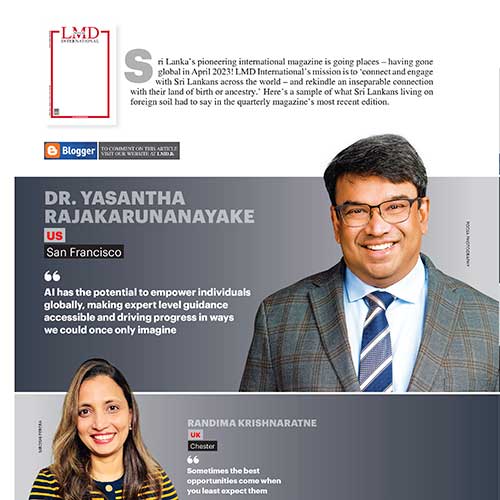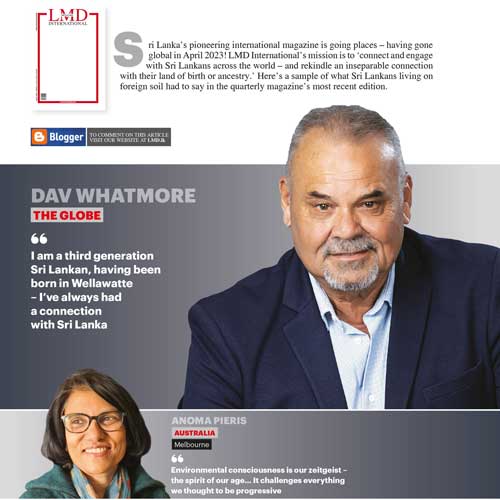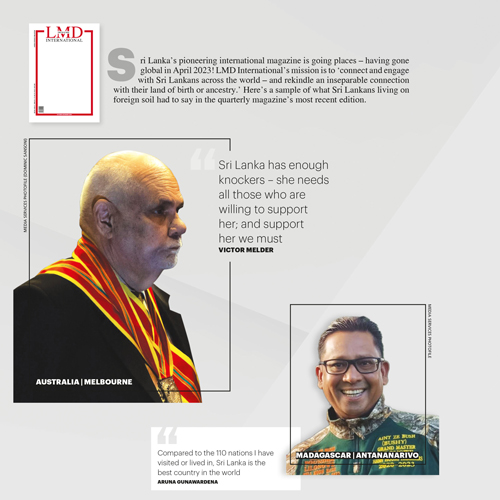SRI LANKANS OVERSEAS
CRISIS RESOLUTION
Sanjay Ihalagama
Sri Lanka needs to change course immediately
Q: As far as perceptions go, do you think Sri Lanka is capable of regaining its composure in the aftermath of the pandemic and economic crisis?
A: Certainly, yes! Sri Lanka has always demonstrated resilience and boasts a proven track record as a country that can bounce back relatively quickly. Certain fundamental changes will be required however, given the prevailing economic predicament.
Q: So how do you perceive Sri Lanka today?
A: Compared to its Asian neighbours, Sri Lanka hasn’t progressed towards its true potential.
Q: How do compatriots in Hong Kong view Sri Lanka?
A: They view it as a great destination to visit; it’s also known for its apparel and tea trade. However, citizens of Hong Kong have little knowledge about the island and bankers sometimes consider it to be an immature market.
Q: Likewise, how do other Sri Lankans living in your country of domicile view the island?
A: Many are concerned that the country has not progressed as much as it could have – especially compared to other Asian countries that have invested in improving infrastructure, education, trade partnerships, digitalisation and diversification of industries.
Sri Lanka has missed several opportunities and wasted its potential.
Q: What were your impressions of the country on your last visit – and how much has it changed from the past?
A: I last visited Sri Lanka in February 2020. Although we have seen some growth in terms of road development and so on, progress is now here near the rest of Asia.
here near the rest of Asia.
We keep comparing ourselves to Singapore; but without looking that far, we can see the economic development in India and Bangladesh. The country needs a course correction to get the basics right.
Q: From afar, how do you perceive news about Sri Lanka?
A: Unfortunately, the country has gained media exposure for all the wrong reasons and the positive news about Sri Lanka – such as its investment potential or the beauty of the island – doesn’t receive adequate publicity.
Q: How do you view the brain drain – and why is there still no reversal of it, in your opinion?
A: It began a few decades ago, for various reasons. Although it was expected to slow down after the war, the situation has become even worse post-pandemic, due to the recent economic turmoil.
The brain drain is an unavoidable consequence as Sri Lanka hasn’t been able to meet the minimum expectations of its citizens – and there’s a lack of hope at this point.
Q: What should Sri Lanka focus on most in the coming decade?
A: Sri Lanka needs a shift in attitudes, better values and a clear policy framework to take the country to the next level – both economically and socially.
Currently, there is no accountability among politicians and public officials; an absence of the rule of law; unnecessary political interference; a lack of meritocracy; corruption at every level; and a questionable work ethic by the labour force at times.
If the country is to have any hope of steady progress, these basic issues must be addressed immediately.
Over the next decade, we should look at overhauling the education system to bring it in line with the latest international developments so that future generations are equipped to face any possible challenges. Entering into trade deals to make Sri Lanka a key partner in global supply chains for IT, electronics and telecommunications etc. is a must.
Modernising the agriculture sector in a sustainable manner that benefits the farming community, supporting local entrepreneurs and startups, effective destination marketing to boost tourism, investments in low-cost sources of energy, taking advantage of its strategic location and transforming our ports into a hub for South Asia should be prioritised.
Further, the government should move away from conducting business and allow state owned commercial entities to be managed efficiently.
Q: And what are your hopes for Sri Lanka in the next decade or so?
A: I hope for a better political culture than what we have had since independence. In addition, a country with a clear set of long-term policies, and a society that respects good values, recognises diversity and has no tolerance for the abuse of power.
As a product of the Sri Lankan education system that fostered my career, I fervently hope my country achieves its true potential.







